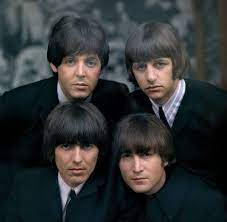Reflecting on the Canonicity of The Beatles
Many lists of rock and roll’s most famous or greatest
artists list The Beatles at the top, and the majority of those who don’t have
Elvis Presley there put The Beatles in the number one spot. There seems to be
major, wide agreement that they are either the most influential or the second
most influential artist of rock and roll. I think that many critics and
listeners would also argue that they are the most famous band out of the entire
recording era (1890s-present).
There are five categories that I’ve been using in compiling
this list and thinking about order: popularity, talent, influence, critical
acclaim, and career longevity. And The Beatles are thought of as being close to
the top ranking in all of these except career longevity. They were only active
as a performing and recording unit for a bit longer than a decade, but even
after their 1970 split one could argue that they remained in the public
consciousness in a huge way—and throughout many countries—up to the present and
are poised to continue. The closest times to a reunion in the 1970s (where Paul
and John joked about reuniting in response to a sketch on Saturday Night
Live) and the 1990s (for the Anthology films, book, and reissues)
made many of their fans feel that The Beatles were in fact back together, at
least insofar as being a major part of English-speaking culture and getting
hits on the radio.
I’ve written about Elvis Presley at the top here, but I have
read and thought a lot about the arguments for putting the top artist as The
Beatles and repositioning Presley to #2. The Beatles are probably the most
influential artist on the production values of modern popular music. Their
roles as both instrumentalists and songwriters created an expectation than
other artists in rock would follow in that way. They also have a large number
of popular rockin’ covers that reified the concept of the rock and roll
songbook as having 1950s roots and a partying atmosphere: “Twist and Shout,” “Roll
Over Beethoven,” “You’ve Really Got a Hold on Me,” “Rock and Roll Music.”
The recordings from The Beatles have been a seemingly-bottomless
well of entertainment for rock and roll’s many debaters and analysts. I’ve read
about all the famous conundrums that pit The Beatles against their influences
or their contemporaries, particularly The Who, The Rolling Stones, and The
Kinks. But one could also read lengthy ruminations about two particular Beatles
albums and their respective merits when weighed against each other: Abbey
Road or Let It Be? Rubber Soul or Revolver? Each album
thought of as a masterpiece almost from the get-go, and room for debate only
peeking out through the cracks in between an odd track placement or a brief interlude
jam and its adjacent powerhouse track. These albums are culturally milestones,
and the interplay between the four musicians is endlessly fascinating for me,
and for millions of others.
I touched briefly on production values, but of course one
could write a book about George Martin’s work on The Beatles’ albums. Then
there are other lengthy stories to be told about Apple Records as an
innovative-though-flawed concept in the recording and music industry, and about
Hamburg, and about the American tours, and about the emergence of rock and roll
as an artform that was totally aware of its own potential. The Beatles were
together in a transitional moment for English-speaking culture, but they also
occupied that moment in a way that highlighted and maximized their talents as
musicians, poets, and performance artists.
I will once again write at length about the quantitative
part below, but I have to also mention the amazing chart dominance that The
Beatles had throughout their peak era in most countries that have music charts.
The fact that they managed to hold down all five of the top spots on the Hot
100 in the pre-streaming era on April 4, 1964 is amazing and tells me that they
had a prominence that only Elvis Presley has ever come close to in my home
country.
One other category to reflect on is the breadth of
influence. The Beatles of course influenced many other British pop-rock bands
that formed right around the time that they came to prominence, but they also
were the basis for the adjective “Beatlesque” that has been used to describe a
wide variety of pop songs in relationship to arrangement, rhythm, vocal
inflection, and harmony. How many other artists on this list have that
distinction? I’ve heard of “Dylanesque” and “Springsteenesque” artists, but
those are the only two I’m thinking of.
Biographical Information:
·
George Harrison (born February 25, 1943 and died
on November 29, 2001)
·
John Lennon (born October 9, 1940 and died on
December 8, 1980)
·
Paul McCartney (born June 18, 1942)
·
Ringo Starr (born July 7, 1940)
Chart History:
·
Hot 100 singles in Billboard: 70
·
Top 40 singles in Billboard: 38
·
Top 10 singles in Billboard: 28
·
#1 singles in Billboard: 20 (for 59 weeks
cumulatively)
·
Top 200 albums in Billboard: 53
·
#1 singles on ARIA charts: 22
·
Monthly listeners on Spotify on 6/6/2022: 26,044,051
RIAA Certifications: 6 Gold album certifications, 16
Platinum album certifications, 20 Multi-Platinum album certifications
Halls of Fame: Rock and Roll Hall of Fame (1988)
Total Releases: 156 albums, 722 singles and
EPs, 333 compilations, 71 videos
Major Awards: 9 Grammys and Lifetime Achievement
Award, 1 American Music Award nomination

Comments
Post a Comment